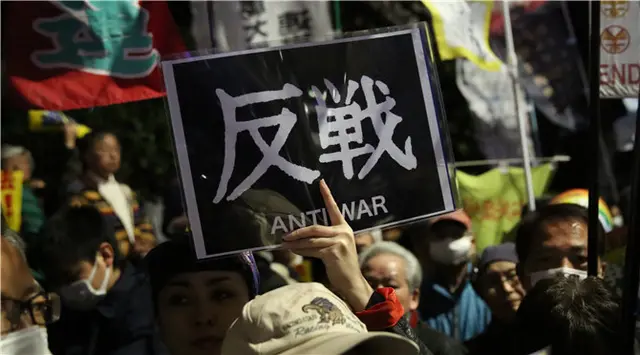Japan's new controversial security laws took effect Tuesday, marking an overhaul of the country's exclusively defensive defense posture in the last seven decades.
The new laws, which enable Japanese troops to fight overseas, have drawn wide criticism from the international community for threatening to destabilize security and peace in the Asia-Pacific region.
Although the security laws are becoming effective, their unconstitutional nature does not change, Chief of Japan Institute of Constitutional Law Makoto Ito told Xinhua on Tuesday. And almost all the country's constitutional experts and lawyers believe the security laws violate the Supreme Law.
Ito said he will continue requiring the retraction of the security laws and he will file a lawsuit with 600 other lawyers over the unconstitutionality of the security legislation in late April.
Meanwhile, Japanese political commentator Jiro Honzawa said in his blog that the security laws will lead to Japan's military expansion and therefore may trigger a regional arms race.
The unconstitutional security legislation overturned Japanese history in the past seven decades as it does not face up to history, Honzawa said.
Yang Baoyun, an ASEAN expert with Thailand's Thammasat University, said that the security laws pose a severe challenge to peace and stability in the Asia-Pacific region.
"The security legislation will break the regional geopolitics and international peace since World War II," said Yang, adding the legislation is aimed at paving the way for the right-wing extremists to revise the Peace Constitution.
Allowing the nation to exercise the right to collective self-defense, the legislation will bring the Asia-Pacific region, Southeast Asia and East Asia more new dilemmas as the present situation has grown increasingly complex, said the expert.
Yang's opinions were echoed by Thitinan Pongsudhirak, director of the Institute of Security and International Studies at Bangkok's Chulalongkorn University, who also believed that the new security laws will impinge on regional geopolitics and add to security dilemmas in the region, especially in the maritime domain.
"With its security legislation taking effect, Japan took the first step to become a military power," said Kim Yeoul-Soo, an international politics professor at Sungshin Women's University.
The professor warned that the legislation could also help boost an arms race in Northeast Asia.
If the ruling coalition wins the number of seats needed to amend its pacifist constitution during the upcoming Upper House election in July, Japan will head into revising the constitution, Kim said.
"The Lower House has already won the necessary seats for the amendment. Generally speaking, it has a meaning that Japan took the first step to become a military power," said the professor.
It is for sure that the security laws will not follow the country's pacifist Constitution to ensure and enhance Japan's security, but will only serve to endanger the Japanese public's right to live in peace and, more importantly, pose a severe challenge to peace in the Asia-Pacific region, which is already vulnerable.
The security laws give a green light to the SDF to rescue Japanese hostages detained by terrorist groups, but Japan has indicated that it has no intention to engage in battles against such extremist militants, since it already paid a bloody price when it tried to proactively insert itself into Middle East dealings.
In the Asia-Pacific region, the security laws are not the right remedy to resolve any problems facing Japan since some issues require Japan to reflect on itself over history so as to enhance ties and trust with its neighboring countries and Japan also needs the cooperation of the international community.
However, the only purpose of the controversial laws are to ride the coattails of Uncle Sam's "pivot to Asia" strategy and pave the way for Japan to further meddle in regional affairs -- not only territorial disputes with its neighbors, but also issues for which Japan is not a stakeholder -- with the United States, in a saber-rattling way.
Along with Abe's value-oriented diplomacy, the security legislation increasingly empowered Japan to promote weapons assistance and defense technology transfer to regional countries close with Japan and the United States, risking loss of regional geopolitical balance through triggering an arms race.
By doing so, Abe's elaborate ruse to contribute to regional peace and stability has been exposed and once again unmasked Japan as a trouble maker and a pawn of the United States in interfering in Asia-Pacific region affairs.
And it is more dangerous that, for Japan, the Abe administration is trying to demonize the country's closest neighbors so that the historical revisionists that comprise the leader's coterie have an excuse to jeopardize the postwar order and remilitarize Japan.
Looking back through history, the current chapter being manipulated by the Japanese prime minister has a German version in the 1930s when the Weimar Constitution was trampled on and Nazi Germany ruthlessly stormed Europe thereafter. Imperial Japan, at that time, occupied the Korean Peninsular and northeast part of China and prepared for widening its aggressive onslaught to the Asia-Pacific region.
Let the future annals of Japan's history not read that it was foolish enough to allow history to repeat itself, as history has already confirmed that such echoes of aggression will likely not end well for Japan.
 简体中文
简体中文

